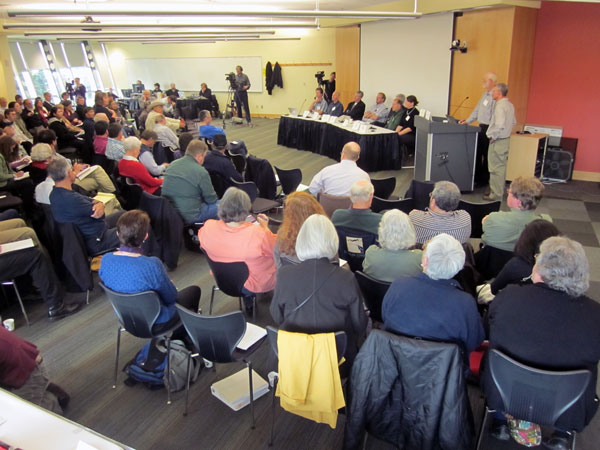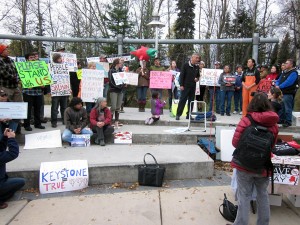
To learn more about the Keystone Science Panels go to The Keystone Center Dialogue on the Potential Development of the Pebble Mine, and you can watch the panel discussion through a live web feed at 360 North.
The second in a series of science panels about the proposed Pebble Mine, got underway Tuesday at the University of Alaska Anchorage library. Panelists are discussing studies conducted in the Bristol Bay Watershed, near the proposed Pebble Mine site in Southwest Alaska. Supporters say the panels will legitimize the science. Critics say that the panels, paid for by the Pebble Partnership cannot be objective.
Protesters held signs critical of the Keystone Center Independent Science panel’s process, taking place at UAA this week. Inside it sounded like this.
“Welcome the Keystone Center’s second in a series dialogues on the proposed development of the Pebble Mine. My name is Todd Bryan.”
Todd Bryan is the man organizing the panels for The Keystone Center, the Colorado-based non-profit organization that the Pebble Partnership hired to conduct the panels. Through the panels, scientists are being asked to evaluate studies in a 27,000 page environmental baseline document that the Pebble Limited Partnership released earlier this year. They’ve hired Keystone Center to determine whether those studies are credible and sufficient. They say the studies being scrutinized could be used to monitor changes in the environment if the mine goes through. Pebble officials say the scientists are not compensated, but they confirm they paid Keystone just shy of a million dollars to organize the panels.
“We’re doing this in a very public forum where we’re bringing in the consultants who did the baseline studies for Pebble and we’re bringing in our science panel members who have a lot of expertise in evaluating those kinds of studies. And then we want to also bring in a public discussion around that so that members of the public can rally bring in missing information that they think needs to be considered,” Bryan said.

During his opening remarks Bryan outlined the steps his organization was taking to ensure that the Keystone Center process is independent of the Pebble Limited Partnership’s influence.
One of the scientists from the panel, University of Washington Professor David Montgomery, recently resigned. He says he believes the panel investigation was flawed because it does not compare the baseline studies to a mine plan.
“I started having the realization that it was very difficult, in my mind at least, to have a very solid take on the adequacy of baseline data go risk assessment without actually having knowledge about what the design of the mine would be,” Montgomery said.
Pebble Partnership CEO John Shively says not having a mine plan is not a problem.
“A mine plan, I don’t think is essential to studying, sort of the methodology of our science, how we quality check it. He’s the only one of all of the scientists that they’ve picked that’s said that. So not everybody felt that that was a necessary part of the process,” Shively said.
Pebble officials say a mine plan, which was scheduled to be released this fall, will likely be presented to the public in 2013 or 2014, and will be part of discussion during a later panel. Another researcher, Daniel Schindler, was dismissed for alleged bias due to opinion pieces he wrote on issues surrounding the development of the Pebble Mine.
During the panel discussions, scientists covered geology, hydrology and water quality. Presenter, Jane Whittset, gave an overview of study areas via a projected map.
“We’ve zoomed in now and you can see Lake Illiamna there and the deposit now. It’s that pink dot to the north of Lake Illiamna. And you see different colored polygons there and those are depicting different study areas,” Whittset said.
Members of the public weighed in on what they were being told. Lindsey Bloom with Trout Unlimited said she wondered what the questions were that drove the scientists doing research for the baseline studies.
“So now we’re just looking at this raw data. And I disagree with you that it could be data just for data. I think data is controlled by the questions that are asked when you collect it. I think there’s something to hide that they’re not presenting that today,” Bloom said.
Some complained that the panels should have been held in the Bristol Bay region rather than in Anchorage. The panels will continue next week, Oct. 9-11, with a different group of scientists discussing fish, wildlife, socioeconomic issues, cultural issues and subsistence. A date is not yet set for the fourth and final panel, which will likely include a discussion of the yet-to-be released mine plan. The Keystone Center Independent Science Panels are open to the public, but you must register to attend.
Daysha Eaton is a contributor with the Alaska Public Radio Network.
Daysha Eaton holds a B.A. from Evergreen State College, and a M.A. from the University of Southern California. Daysha got her start in radio at Seattle public radio stations, KPLU and KUOW. Before coming to KBBI, she was the News Director at KYUK in Bethel. She has also worked as the Southcentral Reporter for KSKA in Anchorage.
Daysha's work has appeared on NPR's "Morning Edition" and "All Things Considered", PRI's "The World" and "National Native News". She's happy to take assignments, and to get news tips, which are best sent via email.
Daysha became a journalist because she believes in the power of storytelling. Stories connect us and they help us make sense of our world. They shed light on injustice and they comfort us in troubled times. She got into public broadcasting because it seems to fulfill the intention of the 4th Estate and to most effectively apply the freedom of the press granted to us through the Constitution. She feels that public radio has a special way of moving people emotionally through sound, taking them to remote places, introducing them to people they would not otherwise meet and compelling them to think about issues they might ordinarily overlook.




